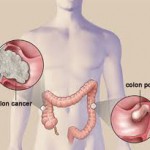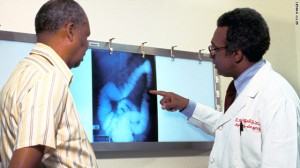

You have a high risk of colon cancer if you:
- Are older than 60
- Are African American of eastern European descent
- Eat a a lot of red or processed meats
- Have colorectal polyps
- Have inflammatory bowel disease (Crohn’s disease or ulcerative colitis)
- Have a family history of colon cancer
Certain inherited diseases also increase the risk of developing colon cancer. Two of the most common are:
- Familial adenomatous polyposis (FAP)
- Hereditary nonpolyposis colorectal cancer (HNPCC), also known as Lynch syndrome
What you eat may play a role in your risk of colon cancer. Colon cancer may be linked to a high-fat, low-fiber diet and to a high intake of red meat. Some studies, though, have found that the risk does not drop if you switch to a high-fiber diet, so this link is not yet clear. Smoking cigarettes and drinking alcohol are other risk factors for colorectal cancer.

Treatment depends on many things, including stage of the cancer. Treatments may include:
- Surgery (most often a colectomy) to remove cancer cells
- Chemotherapy to kill cancer cells
- Radiation therapy to destroy cancerous tissue
Surgery
Stage 0 colon cancer may be treated by removing the cancer cells. This is done using colonoscopy. For stages I, II, and III cancer, more extensive surgery is needed to remove the part of the colon that is cancerous. This surgery is called colon resection.
Chemotherapy
Almost all patients with stage III colon cancer should receive chemotherapy after surgery for 6 – 8 months. This is called adjuvant chemotherapy. The drug 5-fluorouracil can increase the chance of a cure in certain patients
You may receive just one type, or a combination of these drugs. There is some debate as to whether patients with stage II colon cancer should receive chemotherapy after surgery. You should discuss this with your oncologist.
Radiation
Radiation therapy is sometimes used in patients with colon cancer. It is usually used in combination with chemotherapy for patients with stage III rectal cancer.
To know more about Colon Cancer in India please visit this link : http://safemedtrip.com/medical-services/cancer-treatment-in-india/colon-cancer-treatment-in-india.html

 Click to WhatsApp
Click to WhatsApp +91-9899993637
+91-9899993637



